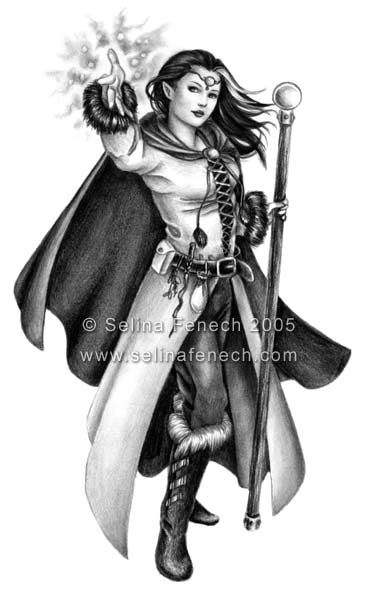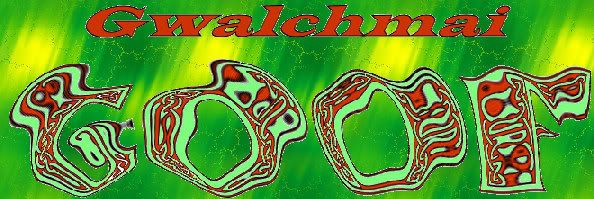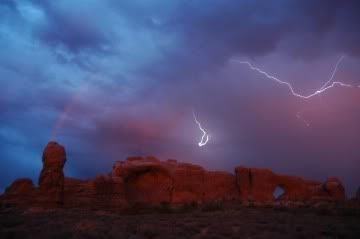Skye
Mabinog
 [M:261]
[M:261]
Posts: 104
|
Post by Skye on Mar 2, 2006 3:50:27 GMT -5
Alrighty! I just finished re-reading Song of Albion for my thesis and I found myself looking into certain nitty gritties I wouldn't have thought of considering earlier. I have some questions that need answering and some observations that need commenting on, and it would be great if someone could help me out here!  1. Lawhead has based his Otherworld scenario on the Celtic past, right? So, didn't the celts ever use bows and arrows? I mean...there were several places throughout the trilogy where arrows would have come very much in handy! 2. The mine workers and beggars...were they dyn dythri too? Or were they citizens of albion? 3. Why is it that Llew returned to the manifest world? He died in Albion just as Nettles, Simon, and the others died...so why does he live? Does this mean that Simon could be alive then? We know that Nettles isn't... 4. At the end Lewis breaks out of his pain and agony by realising something that brings so much joy. 'This is my body broken for you...' ...by that I assumed that he figured his death/sacrifice made Albion whole, and helped the manifest world in turn. But...is this really the cause for his extreme joy? Or has he understood something else that I haven't quite got  5. Alright, this one is just an observation. As I read the chapter on the building of the Mill I began to panic. It sort of hits home the reason why no stranger can stay on in Albion. And why Llew HAS to leave when it is all over. Although the building of the Mill is a simple invention meant to ease the labour of the grain grinders it is still an invention from Lewis' world. If that were to succeed and he were to stay on he would continue to bring into Albion the ideas from his world which could corrupt the place even though his intentions are really good. As Tegid says with some concern when Llew first puts the idea across to him...won't this make the people lazy? A sure way of making Albion a recent past of the manifest world well on its way to the latter's present! Well...this is all I'll put down for the moment. There are quite a few ideas in SoA I would like to thrash out/discuss if folk are willing, but these are the ones I really need some help in. And if you people don't mind I'll put down something more! I'd love to have a solid discussion on the various aspects, symbols, parallels, premonitions in SoA!!!!  |
|
|
|
Post by Child of Immanuel on Mar 2, 2006 8:18:14 GMT -5
3. I think Llew still had a task to accomplish, but Simon was better off not bothering the world any more, and Nettles had nothing left to do.
|
|
|
|
Post by Child of Immanuel on Mar 2, 2006 8:19:12 GMT -5
4. It seems a parallel between Christ's redemption of our world and his redemption of the Otherworld.
|
|
|
|
Post by DanTheMan on Mar 2, 2006 13:01:56 GMT -5
1. Lawhead has based his Otherworld scenario on the Celtic past, right? So, didn't the celts ever use bows and arrows? I mean...there were several places throughout the trilogy where arrows would have come very much in handy! It might be based on ancient Celtic, but as it is the Otherworld I think it's free from any historical limitations. Perhaps it hadn't been invented or it's just not an Otherworldly thing to do. I always assumed they were natives of that island, Tyr Aflac, or whatever. There's something special about Lewis/Llew. He has a special tie to Albion and a special purpose there and in our world. He completed it in the Otherworld, but not in our world. Which, I believe, is for him to tell others about He who gave The Sacrifice for us. (He=Jesus) I take this meaning that Lewis finally understand the sacrifice Jesus made for us - and that it's now up to Lewis to make others understand that, too. (Also, perhaps SRL's calling as well?) You have a good idea here. Is Llew doing something similar to what Simon was doing? Or was it okay for Llew to do this? I think Llew was called away at that time because it wasn't his place to introduce such ideas to the Otherworld, even if it was a good idea. Yes, feel free to post more questions and thoughts! I'm sure others will see and contribute their thoughts as well. |
|
|
|
Post by Gwalchmai on Mar 2, 2006 21:08:00 GMT -5
I'll just respond to one and five since it seems everyone else has those well in hand. 1) The otherworld is the insperation of our celtic world, not the other way around. Also, this is a society built up and structured on honour. So much to the point that is would be seen as embarassing to hide behind ones shield and not meeting your foe face to face and arms wide open as it were. To let the skill decide and not the technicalities. This is quite apparent in any celtic lore you choose to read. Now, what could possibly be honourable to kill your foe with a twig dozens of paces away, keeping you safe from harms way. Nothing to brag about and essentially depreciating your own value. A life is only as good as what you're willing to put at risk. 5) I think Llew's mill had a place in Albion. Its a much more natural transition in technology than having huge smoke stacks and automobiles. Plus its added much more naturally, by training a builder who is even mentioned as catching on incredibly fast. And it isn't finished by Llew or really see the end results of his gift. Besides, if the Otherworld reflects on our world, its only logical that we reflect back on it. And if that reflection is Simon, Lewis, and a MIll, than so be it  |
|
|
|
Post by Tegid on Mar 2, 2006 21:33:38 GMT -5
1. Rhiogan presented a bow and arrows to Meldryn at the llys, when he asked permission to raid the Vedeii. So they at least existed and were known in Albion.
2. I'm with [red]DanTheMan[/red] on this (except for the reference to the duck /jk). I presume that they were degenerate remnants of inhabitants of the land after all the Serpent Men destroyed themselves and died out. While the Bright Flames left nothing but ashes of Weston and all the Dyn Dithri and others who had willingly worked with and followed Siawn, the fire consumed all the Foul Land's wretched mudmen, whores, slaves, and prisoners, but "in their places stood men and women of stature and grace." After this cleansing, the danger of the unraveling was ended, and that would not be the case if transfigured people of the manifest world were left to live in the otherworld.
P.S.: Are you saying you're going to get a master's degree out of this study? *sheer jealousy* That's wonderful!
|
|
|
|
Post by dgan on Mar 3, 2006 3:06:06 GMT -5
Can I weigh in a topic that I always felt has been misinterpreted, but that I have always been to fearful of mentioning before?
The mill, to me, is the key element in the story's paradox. Everything that seems to make the manifest world miserable is technology. The pollution, the daily labor, the laziness all created by the powerplants, corporations, automobiles, etc... Yet Llew introduces a new technology (regardless of how minor) to Albion?! It is just wrong!! Or is it?
In the otherworld, they already had technologies such as weapons, cooking, carts with wheels. They already had manual labor - working the fields or grind the grain. Certainly these were daily labors and specialized jobs. They had sophisticated boats and carts which is a technology created for ease of transportation.
So, you see Llew was not introducing technology - just a new technology. So where does one draw the line where technology begins making us a miserable, dark world? You don't. It is not the technology at all. This is the truth that Lewis comes to.
At the end he notices that the manifest world is brighter. People are happier. It is Lewis that has changed - not the world. Lewis' fight in the Otherworld was against his own demons. It was a fight for his spirit, for his life itself. Only when he was willing to die and leave everything he loved behind was he able to become alive.
It is very easy to read SOA and think that SRL is saying that technology has destroyed the world and we would all be better if we lived back in a simpler time. It is easy to believe SOA is focused on society. But I don't believe that is what Lawhead is saying, at least not primarily. This is a personal journey for Lewis, which allows him to die to himself and his posessions - even his love for his wife and friends - and come to a spiritual awakening where he no longer blames his circumstances or the world for his troubles. But he accepts them, meets them, fights them, and would have it no other way.
He has been awakened by Truth.
|
|
|
|
Post by dgan on Mar 3, 2006 3:13:39 GMT -5
Oh yes, and both Tegid and Gwalchmai are correct, although you have to combine their answers to answer your question.
Bows and arrows were used for hunting, and therefore also surely for contests, but were not used in combat because there was no honor to be gained unless you had bested your opponent in battle.
|
|
|
|
Post by Tegid on Mar 3, 2006 9:55:49 GMT -5
1. There are also bows and arrows in the story of the Great King's Son, told by Tegid at Cynan's wedding feast. The bows are of horn, and the arrows are of walrus ivory with points of gold and eagle feathers. And the arrows brought to Meldryn at the llys were silver pointed. This all sounds quite extravagant for arrows; were they usually made in such a rich fashion?
|
|
|
|
Post by dgan on Mar 3, 2006 10:30:00 GMT -5
That I could not answer for sure. But there are always stories of spectacular daggers or swords or other weaponry, given as gifts, which seem more suited for display than for actual use in combat.
I believe that is Gwalchmai's expertise...
|
|
|
|
Post by DanTheMan on Mar 3, 2006 11:27:58 GMT -5
At the end he notices that the manifest world is brighter. People are happier. It is Lewis that has changed - not the world. Lewis' fight in the Otherworld was against his own demons. It was a fight for his spirit, for his life itself. Only when he was willing to die and leave everything he loved behind was he able to become alive. ... He has been awakened by Truth. This is a very good observation. I remember Scatha saying to Lewis (I forget his name at that time): "You must become the master of your life, not its slave." Which always reminds me of: "He who loves his life will lose it, and he who hates his life in this world will keep it for eternal life." |
|
|
|
Post by Gwalchmai on Mar 3, 2006 13:26:56 GMT -5
Theres a very serious difference in cerimonial gifts such as bows, arrows, swords, sheilds, daggers, ect. The celtcs would perhaps be an exception to the rule on somethings since some of their most highly prized weapons gained their reputation for how well they worked and not how they looked. But I'm sure even they were guilty of making very ornate items of little practical use. I think as far as those gifts are concerned, you give some rich ornate object to the King to display his wealth. Just having a hoard of gold behind your throne doesn't really domuch, however if even your foot stools are covered in some amazing silver and gold design makes the point much more forcibly.
And as a common rule of thumb I've comeup with (at least regaurding swords) the more ornate it is, the less practical use it has.
|
|
|
|
Post by dancer on Mar 8, 2006 16:06:58 GMT -5
Okay, I've read this series and now I have to go back and read it again to gain the insight into what has been discussed here...
It's been a few years since I've read SoA.
|
|
|
|
Post by uisdean on Aug 19, 2007 17:54:13 GMT -5
May I make a comment about the Otherworld? In the Pendragon series, the bards, like Taliesin, make journeys to the Otherworld. I think the Otherworld is a parallel world to ours. It is not Heaven. We don't go there when we die. I think it is a Celtic concept. I don't remember hearing about anything like it in other religions. The only thing outside Celtic thought I know about is the world seen by Don Juan and Carlos Casteneda in "A Separate Reality". But I don't think that corresponds to the Otherworld. But I just drive a truck. Any PhD's out there who know something about this?
|
|
|
|
Post by twyrch on Aug 20, 2007 7:40:18 GMT -5
I always felt SRL made the otherworld as a template for outworld, but one where the two are symbiotic... almost as if the same world, but in a different dimension.
Terry Brooks did this with the Forbidding as well. I am sure, though, that the idea of the otherworld is a Celtic concept and supposed to be the realm of the gods.
|
|






















